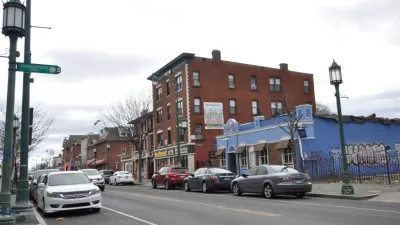Current Texas law grants state representatives significant power over whether affordable developments receive federal tax credits. Controversially, several representatives have proposed the reduction of their own authority in that regard.

Texas has long been a key stage for debates over fair housing, as in the controversy over "disparate impact" that led to a landmark Supreme Court affirmation of civil rights law in 2015 (and subsequent doubts over the future of Obama-era reforms). This year, Jared Brey writes, housing groups and a number of state representatives want to rework the state assessment process for federal Low-Income Housing Tax Credit (LIHTC) applications.
"Currently, state representatives have a lot of sway over proposed development via letters submitted during the assessment process," Brey writes. He goes on, "That power has been used to reinforce patterns of residential segregation in Texas that have been the subject of legal battles for years. [...] Even in the most innocent scenarios, state representatives' support has a very loose connection to the merits of a project, housing advocates say." Less innocent allegations include the political entrenchment of racist attitudes and outright bribery.
Several state reps are currently trying to remove the letters from LIHTC scoring criteria, Brey says. "Proponents of the new bills hope that the recent high-profile examples of state representatives blatantly misusing their influence over low-income housing projects will give the legislation a better chance of passing this year."
FULL STORY: Some Texas Lawmakers Are Trying to Deflate Their Housing Power

Alabama: Trump Terminates Settlements for Black Communities Harmed By Raw Sewage
Trump deemed the landmark civil rights agreement “illegal DEI and environmental justice policy.”

Planetizen Federal Action Tracker
A weekly monitor of how Trump’s orders and actions are impacting planners and planning in America.

The 120 Year Old Tiny Home Villages That Sheltered San Francisco’s Earthquake Refugees
More than a century ago, San Francisco mobilized to house thousands of residents displaced by the 1906 earthquake. Could their strategy offer a model for the present?

In Both Crashes and Crime, Public Transportation is Far Safer than Driving
Contrary to popular assumptions, public transportation has far lower crash and crime rates than automobile travel. For safer communities, improve and encourage transit travel.

Report: Zoning Reforms Should Complement Nashville’s Ambitious Transit Plan
Without reform, restrictive zoning codes will limit the impact of the city’s planned transit expansion and could exclude some of the residents who depend on transit the most.

Judge Orders Release of Frozen IRA, IIJA Funding
The decision is a victory for environmental groups who charged that freezing funds for critical infrastructure and disaster response programs caused “real and irreparable harm” to communities.
Urban Design for Planners 1: Software Tools
This six-course series explores essential urban design concepts using open source software and equips planners with the tools they need to participate fully in the urban design process.
Planning for Universal Design
Learn the tools for implementing Universal Design in planning regulations.
Clanton & Associates, Inc.
Jessamine County Fiscal Court
Institute for Housing and Urban Development Studies (IHS)
City of Grandview
Harvard GSD Executive Education
Toledo-Lucas County Plan Commissions
Salt Lake City
NYU Wagner Graduate School of Public Service





























